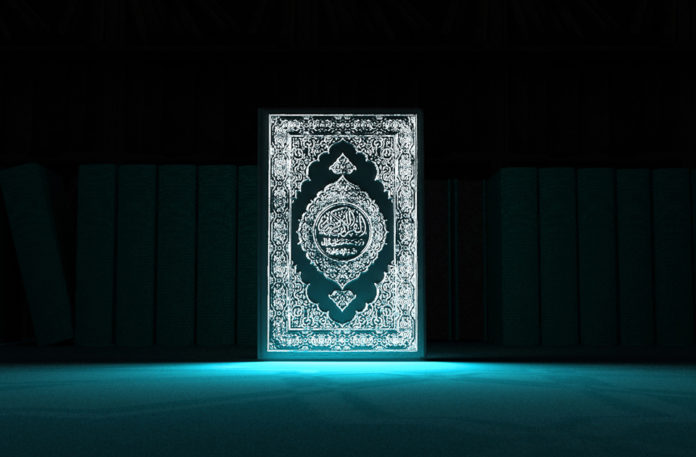KEY: (Q), ‘Ali al-Qâri, Sharh Shamâ’il (M) Munâwi, Sharh Shamâ’il (MS) Miscellaneous additions
(Q) The narrations and scholars differed as to whether the Prophet ﷺ dyed his hair or not. an-Nawawî said, ‘The preferable opinion is that he ﷺ did actually dye his hair for a time as is proven by the hadîth of ibn `Umar recorded in the Two Sahîhs, it is not possible to leave this hadîth or explain it away. However most of the time he did not dye his hair, so each person narrated what he saw of his practice and all were truthful in what they narrated.’[1] (MS) Bukhârî records on the authority of Ibn `Umar that he saw the Messenger of Allâh ﷺ dyeing his hair. Abû Dâwûd records on the authority of Ibn `Umar that the Prophet ﷺ used to wear tanned leather sandals and would dye his beard with waras (yellow colouring) and saffron and ibn `Umar would do the same.
1/45 Ahmad ibn Manî` narrated to us; Hushaym narrated to us; `Abdu-l-Malik ibn `Umayr narrated to us; from Iyâd ibn Laqîţ who said; Abû Rimthah informed me that,
| I came to the Messenger of Allâh ﷺ with my son. He asked, “Is this your son?” I said, ‘Yes, bear witness to it.’ He said, “He will not be responsible for your crimes and you will not be responsible for his crimes.” I saw that his white hairs were red.[2]
Abû `Îsâ said, ‘This is the best of what has been reported concerning this topic, and the most clear. This is because the authentic narrations show that the Prophet ﷺ did not reach the stage of having white hairs. The name of Abû Rimthah is Rifâ`ah ibn Yathribî at-Taymî.’ |
“I came to the Messenger of Allâh ﷺ with my son. He asked, “Is this your son?” I said, ‘Yes, bear witness to it,'” (Q) in some texts the wording is, ‘I bear witness to it.’ (M) This statement serves to further consolidate the meaning of his affirmation either because someone may be in doubt concerning this fact or to show that he was responsible for the crimes of his son in accordance to the ways of Jâhiliyyah (Q) that the father was responsible for the actions of the son. Islâm has negated this thinking with the words of Allâh, “No bearer of burden shall bear the burden of another,”[3] and this is why the Prophet ﷺ said, >”He will not be responsible for your crimes and you will not be responsible for his crimes.” (Q) i.e. you will not be held accountable for his sin and he will not be held accountable for your sin, (M) rather you are responsible for your own crimes. The essential meaning of janâyah (crime) is dhanb (sin) but the word has been predominantly used by the Legal Jurists to refer to matters such as killing, inflicting wounds, and the likes. (Q) Ahmad has the wording, via the same route, “Is this your son?” He replied, ‘Yes, by the Lord of the Ka`bah!’ He ﷺ asked, “Your own son?” He said, ‘Bear witness to it.’ He said, “He will not be responsible for your crimes and you will not be responsible for his crimes.” Another narration of Ahmad mentions that the Prophet ﷺ then recited, “No bearer of burden shall bear the burden of another.”
>”I saw that his white hairs were red,” (Q) either because they were just turning white or because they had been dyed, the latter option would be the reason why this hadîth has been included in this chapter[4] (M) and is proven by the narration of al-Hâkim, ‘His white hairs were red, being dyed with henna.’ (Q) Abû Dâwûd records on the authority of the same narrator, Abû Rimthah that, ‘He ﷺ had stained his beard with henna.’ Ibn al-Jawzî records in his Kitâb al-Wafâ´ on the authority of Abû Rimthah that the Prophet ﷺ would dye his hair with henna and katam. This narration explicitly shows that he would dye his hair.
“Abû `Îsâ said, ‘This is the best of what has been reported concerning this topic, and the most clear. This is because the authentic narrations show that the Prophet ﷺ did not reach the stage of having white hairs,” (Q) meaning that he did not reach the stage of having plentiful white hairs, rather only a few such that he was not in need of dyeing.
2/46 Sufyân ibn Wakî` narrated to us; my father narrated to us; from Sharîk; from `Uthmân ibn Mawhab who said that Abû Hurayrah was asked,
| ‘Did the Messenger of Allâh ﷺ dye his hair?’ He replied, ‘Yes.’[5]
Abû `Îsâ said, ‘This hadîth was also reported by Abû `Awânah; from `Uthmân ibn `Abdullâh ibn Mawhab who said; from Umm Salamah.’[6] |
“Abû `Îsâ said, ‘This hadîth was also reported by Abû `Awânah; from `Uthmân ibn `Abdullâh ibn Mawhab who said; from Umm Salamah.'” (Q) Bukhârî also records on the authority of `Uthmân ibn `Abdullâh ibn Mawhab who said, ‘I entered upon Umm Salamah and she brought out a hair of the Messenger of Allâh ﷺ which was dyed.’ Ibn Mâjah and Ahmad add, “ with henna and al-katam.” al-Ismâ`îlî records that ‘a hair from the beard of the Messenger of Allâh ﷺ was in the possession of Umm Salamah and it had on it the traces of henna and al-katam.’
(Q) The fact that they were in the possession of some Companions, dyed, is not a proof that the Prophet ﷺ himself dyed them. (MS) ad-Dâruquţnî records in Rijâl Mâlik, and it is also to be found in his Gharâ´ib Mâlik, on the authority of Abû Hurayrah that when the Prophet ﷺ passed away, whoever had any of his hairs would dye them so as to preserve them and make them last longer.[7]
ENDNOTES
1. Nawawî, Sharh Ŝahîh Muslim [15/77]; this was also stated by al-`Ainî, `Umadatu-l-Qârî [11/297]
2. Hadîth #43.
3. al-Isrâ´ (17): 15
4. Refer to the comments of (Q) to hadîth #43.
5. The author was alone in recording it.
6. Bukhârî.
7. Ibn Hajr [6/708].
(NOTE: If you want to build a strong and powerful relationship with Allah, check out Islamia TV, where you can watch Islamic speakers from across the globe deliver inspiring and motivational courses. Learn more at www.islamia.tv.)






















